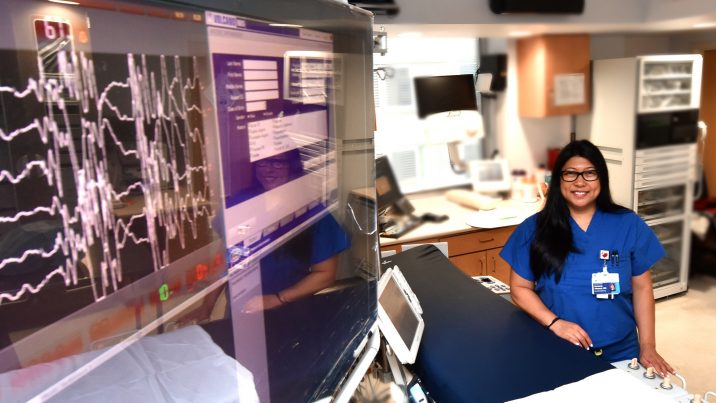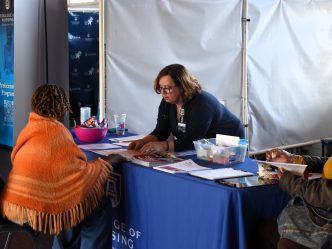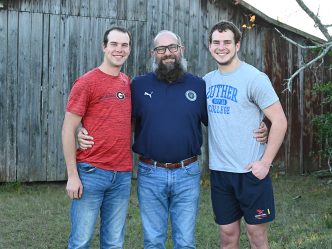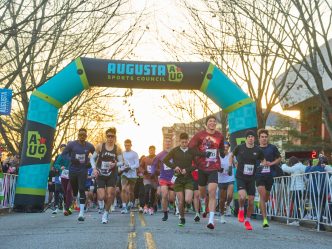Faculty from the Cardiovascular Center at the Medical College of Georgia and Augusta University Health have been invited to give presentations on building a structural heart program, which focuses on tissues and valves rather than blood vessels of the heart, at one of the world’s largest meetings of interventional and structural cardiologists.
Dr. Kimberly Atianzar, a cardiologist who joined MCG last year to help build the medical school and its teaching hospital’s structural program, will present two sessions at the Transcatheter Cardiovascular Therapeutics meeting today through Sept. 29 in San Francisco. The meeting is sponsored by the Cardiovascular Research Foundation and hosts nearly 15,000 of these specialists each year.
One session will focus on how to build a structural heart disease program featuring transcatheter aortic valve replacement, or TAVR, and MitraClip, a procedure that uses a catheter to place a clip that improves the heart’s mitral valve function. The other session will focus on Atianzar’s experiences at an academic institution with a new structural heart program.
Structural heart programs are typically comprised of multidisciplinary teams that include general cardiologists, structural interventional cardiologists, cardiac surgeons, radiologists, cardiac anesthesiologists, a program coordinator, a registered nurse and cath lab and operating room staff, all of whom help in treating defects in the heart’s valves, walls or chambers. These heart problems can be present at birth or develop over time due to diseases such as high blood pressure, kidney disease, calcium buildup, deformed valves, radiation therapy, rheumatic fever and bacterial endocarditis.
Historically, open-heart surgery has been the common method for treating those defects. However, procedures like TAVR, which allow the replacement of the heart’s aortic valve through the arteries, have become a viable alternative to patients. The procedures typically are less risky, cause less scarring, less blood loss, less pain and have a quicker recovery time.
The first TAVR at MCG and AU Health was performed in January. The program has evolved since and now also treats other valve-related defects, including mitral valve regurgitation a condition in which the heart’s mitral valve doesn’t close tightly, allowing blood to flow backward into the heart. Physicians can guide a catheter through the femoral vein to the heart’s left ventricle and place a device called a MitraClip, which closes the valve more completely.
“The program has grown so much since January, allowing us to treat other valves, not just the aortic valve,” Atianzar says. “When I came here, I had a seven-page proposal on what it would take to build a program and the support has just been amazing — from the top down.”
That support has been crucial to the team’s success, she says. “The entire structural heart team, from chief of the Division Cardiothoracic Surgery Dr. Richard Lee, to interventional cardiologist Dr. Vishal Arora and Dr. Gyanendra Sharma, director of the hospital’s echocardiography lab, and the rest of all my wonderful cardiology colleagues, to our awesome structural program coordinator and our structural registered nurse, the cath lab and operating room staff, our radiology and anesthesiology colleagues, have all been so hard working and have helped the program grow. We’re now trying to do at least two or three TAVRs a week and about one or two MitraClips a week with a future goal of at least four TAVRs a week and two or three MitraClips a week. We’ve done about 35 TAVRS and 10 MitraClips so far this year and we see about 20-30 valve patients a week in clinic. I am looking forward to the continued growth of this much needed program.”
After completing her internal medicine residency at the State University of New York Health Science Center at Downstate in Brooklyn and the Los Angeles County, University of Southern California Keck School of Medicine, she completed fellowships in cardiac echocardiography at USC, cardiovascular medicine at Tulane University in New Orleans, interventional cardiology at the University of Massachusetts in Worcester, advanced cardiovascular imaging at the University of California, San Diego, and structural heart disease at Swedish Heart and Vascular Institute in Seattle. Atianzar is one of just 10 women in the country specializing in structural heart disease. She also is the only cardiologist in the country trained in all three specialties – interventional cardiology, advanced cardiovascular imaging and structural heart disease.
 Augusta University
Augusta University




